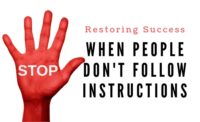 Building relationships with adjusters is something that draws attention in our industry, as it is a cornerstone of developing any restoration business.
Building relationships with adjusters is something that draws attention in our industry, as it is a cornerstone of developing any restoration business.
In 1994, I married a claims adjuster. Working at home on estimates into the wee hours of the morning, the phone ringing at 11 p.m. with an insured unhappy about a claim and the intense pressure of handling high volumes in accordance with best practices, the life of an adjuster can be stressful.
So how do you work better with them? The first step is to understand the responsibilities of the adjuster. A claims adjuster is required to settle claims in accordance with the policy. At times, they must deny claims where there is no coverage in the policy. They have job requirements and expectations to meet, from time frames to contact an insured to diaries and documentation of a claim. Their estimates and files are reviewed and audited for compliance to company standards. They have a job filled with challenges.
Like all people, adjusters come in a wide range of personalities. The bottom line is that some people just click with certain people. People like certain people and work better with some than others, and like all relationships this applies to the restoration professional and adjuster relationship. Restoration professionals should not be offended if a particular adjuster prefers to work with an individual within your company over another based on personality. If there is a particular person that many adjusters seem to gravitate to, take a step back, put your ego aside, and look at the relationship objectively.
The following are some tips for you to consider in your approach to building relationships with adjusters:
1. Do not offer any gifts of significant value: Typically, this puts an adjuster in an awkward position as most companies have strict policies on not accepting any type of gift. Even if this is an innocent gesture on your part, it could easily be misconstrued. If, for example, you send out fruit cakes to your business partners at the holidays, it is best to ask permission of the adjuster. Pens and trinkets of this nature are usually acceptable.
2. Do your job well: Sounds simple? The better you do your job, the easier you make the adjusters’ job.
a. Estimates:
i. Accurate and thorough - nothing more and nothing less.
ii. Write good estimates using accurate measurements.
iii. Include as much detail and explanation to line items as possible.
iv. Pictures: Submit all pertinent pictures to the adjuster for their file.
v. Timely: The faster you submit your good estimates, the better.
vi. Supplements: Supplements happen in our business. Make minimal use of supplements by writing thorough estimates to begin a job. Supplements that are required because of unknown circumstance are understandable.
b. Happy Customers: Happy customers make happy adjusters. Phone calls from policyholders complaining is not a good relationship building technique. Sometimes things go wrong. Be proactive by notifying the adjuster with the issue and your plan of action to rectify it for the customer. For the most part, if you consistently do the right thing, an occasional problem handled properly will be understood by an adjuster.
3. Work with the Adjuster in the spirit of cooperation.
a. Work towards an agreed price with the best intentions for a long term relationship. Communicate with facts and articulate well.
b. Never throw an adjuster under the bus. Do not sacrifice the adjuster to protect yourself to a customer. Work as a team to get the policy holder to pre-loss condition.
c. Always be honest and upfront.
As you work on building relationships with adjusters, it is important to understand their job and how you fit into the process of settling a claim. Be consistent and honest and the rest will fall into place.







